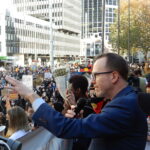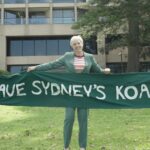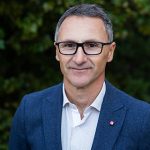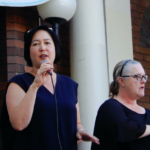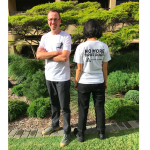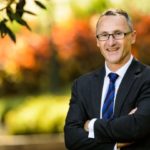A More Inclusive City of Sydney: An Interview With Greens Council Candidate Sylvie Ellsmore
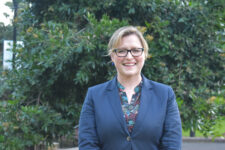
Since the 2016 City of Sydney council elections, the political climate has changed dramatically, as multiple crises have swept through NSW, which have included the years-long drought, the 2019-20 bushfires and the COVID-19 pandemic.
These crises have led to dramatic social transformation to the point that a much wider portion of the population has come to realise that the cosmetic approach that’s been taken to dealing with the underlying causes of these issues no longer cuts it, especially in terms of changing climate.
So, as those living in the Sydney local government area look towards the 4 September election, there’s an understanding that while the council representing the nation’s largest city has been a leader in producing progressive policies, there’s more room for it to follow through on them.
And that’s what lead candidate on the NSW Greens ticket Sylvie Ellsmore plans to do if elected as City of Sydney councillor.
The native title lawyer aims to not only see the creation of policy targets that promote needed changes, but she intends to see the reforms actualised.
Diverse representation
Whilst Sydney has recently dropped down in the list of the world’s most expensive cities, it’s still up there in terms of the cost of living and property prices. And Ellsmore is concerned that the voices of the city’s less affluent residents are often not being heard at council chambers.
The former Marrickville councillor stresses that a large portion of City of Sydney residents are renters, yet their needs aren’t being prioritised in the same way that those of property owners are being met at Sydney Town Hall. And this is something she seeks to change.
Whilst the City of Sydney has had a strong focus on dealing with rough sleepers over the last decade, Ellsmore asserts that this approach to homelessness has to be broadened in terms addressing those struggling with no fixed address despite not being out on the street.
The former NSW Aboriginal Land Council policy coordinator also has a long history of working with First Nations communities. And she’s determined there’s a need for local Aboriginal and Torres Strait Islander peoples to work more closely with council in terms of community and cultural initiatives.
A councillor for the 2020s
While Ellsmore represented the NSW Greens on Marrickville council over the four year period ending in May 2016, she was heavily involved in making the local government area one that prioritised the inclusion of asylum seekers and refugees.
And if elected to City of Sydney council in September, the NSW Greens member will also bring her long-term commitments to promoting new affordable housing, defending public services and the expansion of green spaces.
Sydney Criminal Lawyers spoke to the NSW Greens candidate for City of Sydney lord mayor Sylvie Ellsmore about the need for council to follow through on climate promises, the role that it should take in terms of refugees, and the legacy of former deputy lord mayor the late Irene Doutney.
Firstly, you’re running as the lead candidate on the NSW Greens ticket in the 4 September City of Sydney council election.
While Greens members feature prominently within the ranks of inner city councils across Australia, this is not currently the case in Sydney. Sylvie, why does this need to change?
The inner city is made up of progressive communities. And the Greens have always played an important role on the City of Sydney council, including twice as deputy lord mayor.
The last term has been the first time in twenty years that the Greens have not had representation on council.
We’ve always played a role in pushing council to take stronger, bolder actions on issues that residents care about, and that particularly includes climate change.
The Greens played a key role in pushing council to acknowledge that there’s a climate emergency – although the official declaration didn’t come until later – as well as to have strong environmental policies.
We also pushed early on for council to have strong affordable housing policies and strategies.
That’s one of the things I did as a councillor for Marrickville. It was one of the things that Irene Doutney did on Sydney council.
But also, before that, there was Chris Harris, who was the first Greens deputy lord mayor of Sydney.
You’ve touched on this already, but along with social justice issues, a priority for the NSW Greens is the environment.
The City of Sydney declared a climate emergency in June 2019. And Sydney council has long had a focus on environmental policies.
In your understanding, how could this be bettered?
One of the reasons we need Greens on council is because the city acknowledges that we’re in a climate emergency, but we don’t believe the actions match the scale of the crisis that we’re facing.
So, for example, council has strong policies around making its operations carbon neutral and to invest in some local energy solutions. But it has the resources and profile to implement world-leading programs.
We want council to do things like be more ambitious with its investment in local renewable energy, and we want it to do that in partnership with local organisations and communities.
We want the council’s sustainability initiatives and incentives to be available to everyone, regardless of residential status, as more than half the city is made up of renters.
So, programs to support renters to reduce their carbon footprint. When we’ve talked to renters on the booths, we found that at the moment council programs are not directed towards them, and we need to ensure that the city is supporting everybody in reducing their carbon footprint.
We’re keen to ensure that council has a specific renters’ strategy around sustainability.
It’s also important that council has direct responsibility for key areas of emissions, like waste. The council has outsourced a lot of its waste services, and we need to bring those back in house.
If the COVID pandemic taught us anything, it’s that we need strong publicly controlled services, if we’re going to quickly respond to crises that we face. That includes our waste services.
We need to prioritise making food waste recycling bins available for all households. This is something that has been piloted in the city and there are plans to roll out.
But making those schemes actually available to everybody is something that smaller and less wealthy councils have already been able to achieve.
We’re also concerned that some areas where the city has set strong environmental targets that these have not always been met.
The city had a visionary urban forest strategy in 2013. It had a target of 23.5 percent tree canopy for 2020, but it didn’t meet that target.
The city set new targets – which aren’t as strong as Melbourne’s targets – but we need to ensure that there’s action and resourcing behind them to genuinely meet those targets as they’re important.
The city has strong environmental programs, but we think it can do more, and it could do it in a more inclusive way.
You’re a native title lawyer. And you have long worked and campaigned around First Nations justice issues.
Recently, you suggested that if elected, you’d set about ensuring that the city is more inclusive in terms of acknowledging its Aboriginal past and present. Can you talk on this point?
For much of my career, I’ve been lucky to work with traditional owners, land councils, and activists for First Nations justice, as well as around protecting country and cultural heritage.
I’ve been a native title lawyer, but I’ve also worked as a policy coordinator for the state land council.
It’s broadly acknowledged that the city could do more to work in partnership with Aboriginal and Torres Strait Islander communities and local organisations.
It could do more to ensure that its commitment to recognising First Nations self-determination is something that translates into practice.
One obvious way that the city could do better is by addressing the historical legacy of First Nations communities, which has been excluded from recognition.
So, this would include renaming and co-naming parks and streets, and updating historical signs that currently only report on colonial first contact history, but don’t mention invasion, or how the city was established.
This needs to be a priority of council. Those kinds of everyday stories that people don’t know about our city, belong to everyone and need to be promoted.
We also have such an interesting civil rights history in this city. Sydney is the birthplace of our first community-controlled medical organisations and the first community-controlled legal services. That is the Aboriginal Legal Service, which was established even before Legal Aid.
This is all information that you can find if you research hard enough on the web. But it’s not promoted in a way that our other history is – in that tangible way that’s part of the history we connect with as we walk through our parks and streets.
There should be targets for council to be upgrading its parks and doing that actively – not just doing one-off small projects. This is much overdue.
We’re also keen to talk about how the city can work in better partnership, and share power in decision-making with all communities, but, in particular, with Aboriginal and Torres Strait Islander communities.
We would like the council to move from consultation around how it does things to more general decision-making, like participatory budgeting.
Council could ensure that the budgeting for its community programs and cultural heritage programs is directly determined by Aboriginal and Torres Strait Islander communities, rather than just consulting with them.
A key issue for the City of Sydney over recent years has been homelessness. How should the city be acting on this issue?
The city has a strong homelessness unit. And it’s got a good partnership with the state government, which focuses on rough sleepers.
This is important because the number of rough sleepers is growing. And while there were all those additional services provided during COVID, the overall trend hasn’t changed.
So, it’s important that we continue that work. But it’s also important when we talk about the growing homelessness in the city that there’s an understanding of the different people experiencing homelessness.
People who experience homelessness can include people who are fleeing violence and are seeking temporary refuge accommodation in the city.
Every day, lots of people are turned away from those services, as inner city services are being priced out with high rents, so they can no longer meet the scale of needs that are out there.
People experiencing homelessness includes people who are couch surfing. These are people who don’t have a home and are living in overcrowded conditions, which is another increasing issue in the city.
We are keen for the city to go further, so it does more to meet the scale of the crisis that we have and that means having strategies that more broadly understand who is experiencing homelessness and taking action that shows genuine leadership across all of those areas.
There’s a group of refugee rights activists that hold a regular Friday afternoon rally out the front of Sydney Town Hall. One of the participants, Stephen Langford, often laments that the city won’t acknowledge that refugees are welcome with a sign.
During your time as a councillor in Marrickville, you ensured that such a sign was on display at the local council chambers.
In your opinion, what sort of role should local councils be playing in terms of assisting refugees and asylum seekers?
I do know that the council has formally moved to be a welcome refugee city. That was something that councillor Irene Doutney did when she was on council.
Also, a joint initiative with the Asylum Seeker Centre that I undertook as a Marrickville councillor, and Irene did on Sydney council, was to pass a motion to pilot a refugee passport, which basically aimed to provide support and low fee access to all council services for people seeking asylum or those who have refugee status.
An important role the city has is to provide access to those services to groups who tend to have low income or need more support. The city can afford to do that.
Those groups also need support in knowing how to access those services. So, there need to be tailored programs that see translations in other languages and connect to people who are accessing particular services.
But it’s also important that the council plays a leadership role. Particularly with COVID, we’ve seen an increase in the level of racism on the city streets, an increase in the number of verbal attacks that people are experiencing, as well as an increase in the level of online attacks.
A council like the City of Sydney coming out and loudly and proudly saying that Sydney is a place that welcomes refugees is an important leadership role that can counteract some of the racism that we’re experiencing.
Part of it is those practical services. But you cannot underestimate how important that loud public leadership is.
Being one of the most well-known councils in the country, it’s very important that the City of Sydney steps up to do that actively. It has a responsibility to do that because refugees and asylum seekers play a really important role, and they always have in the city.
You’ve remarked that you’re honoured to be following in the footsteps of former City of Sydney Greens councillor the late Irene Doutney. How would you describe the legacy of the former Greens deputy lord mayor?
Irene was someone who I worked with. She was a friend. And she was also a mentor. She taught me a lot about the right way to do politics, and the kind of way that I wanted to live my life.
As a public housing tenant, Irene recognised that the most important role she played on council was ensuring that people who didn’t always have a voice in decision-making had a voice at the highest level and a genuine seat at the table.
That included public housing tenants, but it also included a whole lot of other people who are low income, living in the city, and often excluded.
One of the really important things that she did was to always hold the city to account by making sure it wasn’t making decisions about people’s lives without directly involving them.
Unfortunately, there’s a lot of proposed developments in the city around public housing at the moment, but the people whose lives are directly affected aren’t being given a seat at the table in discussions. That is not okay.
One of the things that Irene did well on council was make sure that transparency was there in decision-making.
Another important thing that Irene did was always being a strong advocate of the rights of everyone to public space. She was a strong advocate of the right to protest.
Irene campaigned strongly against police violence on the street, in relation to the harassment of people sleeping rough and in relation to activists.
This is an important role that the city needs to be stronger in: speaking up so that the streets are for everybody, and it’s not acceptable that we have the level of police violence that we have, as well as the harassment of some communities living in the city.
Irene understood that council was about a lot more than just roads, rates and rubbish.
She understood that it was important to remember whose voices weren’t represented at the table, and our job, as Greens councillors, is to work hard to make sure that that space is made for people that decisions are having a genuine effect upon.
And lastly, Sylvie, besides what we’ve covered already, what are some of the other issues that you would seek to prioritise if elected NSW Greens City of Sydney councillor?
An area that we’re interested in is around council investments. It doesn’t sound very sexy, but it can be. It’s about moving beyond the consultation model that the council does business in to genuine community participation and partnership.
The Greens were formed on local council partly because one of our pillars is grassroots democracy. That means considering those whom decisions are going to affect and ensuring that their voices are heard and genuinely supported.
We’re quite keen on ensuring that council has better strategies for engaging with renters and people that are a really important part of the city who are often not represented in council decision-making or don’t have as ready access to engage in council decisions that are affecting their lives.
In a couple of weeks, we’ll be releasing some modelling and costings around how council could better invest and radically expand the role that it’s currently playing in supporting the growth of affordable housing, and, by that, I mean genuinely affordable housing.
This includes models around cooperatives and tenant-led models. These are some of the models that we need in the mix if we’re going to stop traditional communities being pushed out to the margins of the city.
So, we’re excited about being able to release those in the next couple of weeks. We think the city can use the resources that it has in a much smarter way to play a much stronger leading role in terms of influencing affordable housing than it currently is.
It does some good, but it’s not having the impact it needs given the scale of the affordable housing crisis.


